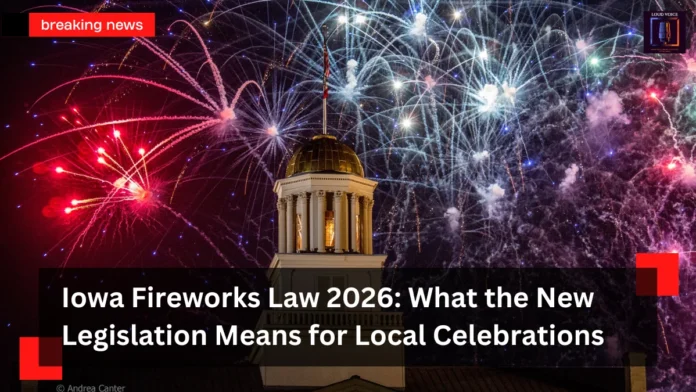Key Takeaways
- The Iowa House has passed a bill restricting local governments from banning fireworks on key patriotic holidays.
- The legislation aims to align Iowa’s celebrations with Donald Trump’s proposed 250th U.S. anniversary festivities.
- The bill’s detractors claim it threatens public safety and erodes municipal authority.
- The final decision now rests with Governor Kim Reynolds, who has yet to sign the bill into law.
Iowa Fireworks Law 2026: State Pushes for Uniform Celebration Rules Amid 250th U.S. Anniversary Plans
In a move set to reshape how Iowans celebrate America’s most patriotic holidays, the Iowa House passed a controversial bill limiting the power of local governments to restrict fireworks use during key dates. The legislation, known as Senate File 303, passed by a 51-39 vote and now awaits Governor Kim Reynolds’ signature. Supporters say the bill paves the way for grand celebrations leading up to the 250th anniversary of the United States in 2026, a milestone event being heavily promoted by former President Donald Trump.
A Fireworks Freedom Bill Backed by Patriotic Sentiment
The bill’s core principle is straightforward but profound: aside from the broad guidelines already established by state law, Iowan communities and counties would no longer be permitted to prohibit or severely restrict consumer fireworks on July 3, July 4, and December 31. This includes municipalities like Des Moines, Ames, and Iowa City, all of which currently have local ordinances that prohibit or restrict fireworks within their limits.
Rep. Bill Gustoff, R-Des Moines, who managed the bill on the House floor, indicated that the legislation is designed to protect patriotic Iowans from unintentionally violating local ordinances while celebrating national holidays. He suggested the change would ensure that residents could mark occasions like Independence Day without legal confusion. Gustoff also said Iowa is eager to host major events related to America’s 250th anniversary, which would be in line with former President Trump’s plan to celebrate the country’s semi-quincentennial for a year. He pointed to the Iowa State Fairgrounds as a potential launch site for the festivities, signaling the state’s readiness to take a leading role in the commemorations.
The Spark Behind the Legislation: Celebrating America’s 250th
Trump’s proposed “Great American State Fair” would span from Memorial Day 2025 through July 4, 2026. Gustoff and other proponents believe Iowa should embrace this opportunity fully — and that means loosening local fireworks restrictions to allow everyone to participate freely in the festivities.
With fireworks being a long-standing symbol of American celebration, Gustoff emphasized their cultural significance.
As he stated during floor debates, “Fireworks have been around for thousands of years… they’re here to stay.”
Not Everyone Is on Board: Public Safety and PTSD Concerns
Despite the patriotic pitch, the bill has met strong opposition, particularly from Democratic lawmakers and public safety officials. Senate Minority Leader Janice Weiner voiced serious concerns, pointing out that all major fire safety groups—fire marshals, fire chiefs, and firefighters—oppose the legislation.
Rep. Eric Gjerde, D-Cedar Rapids, proposed an amendment to ban all consumer fireworks for personal use, citing public safety data. He noted that the Cedar Rapids Fire Department responded to 636 fireworks-related calls in just over a month during the summer of 2024. These calls included multiple small fires and panic-inducing incidents mistaken for gunfire.
“Veterans with PTSD, parents with small children, pet owners—these are the people who suffer the consequences,” Gjerde explained. “We’re ignoring the needs of local communities by stripping away their control.”
Though Gjerde’s amendment ultimately failed, it underscored the divide between state lawmakers seeking statewide uniformity and local officials trying to protect community interests.
What the New Law Would Change in Practice
State legislation in Iowa currently permits the usage of fireworks from June 1 to July 8 and again from December 10 to January 3. However, local governments have historically had the ability to impose stricter regulations within their jurisdictions. If Governor Reynolds signs SF 303 into law, that flexibility will be stripped—at least for July 3, 4, and December 31.
It’s a major shift that would:
- Override any city regulations prohibiting fireworks on those particular days.
- Allow any eligible adult to set off consumer fireworks during legal hours without fear of violating local rules.
- Remove power from municipalities like Iowa City, where fireworks are currently outlawed.
While proponents argue this makes the law clearer and fairer for all Iowans, critics warn it could lead to increased fire hazards, noise complaints, and strain on emergency responders.
National Implications: A Template for Other States?
Though the Iowa fireworks law 2026 is limited to one state, it might serve as a bellwether for similar legislative trends nationwide. With the United States gearing up for a historic 250th birthday, other states may follow suit to ensure they can fully participate in the celebrations without legal ambiguity.
Political observers have noted that Trump’s 250th-anniversary proposal could catalyze a series of culture-centered laws aimed at rekindling patriotic traditions across the country. Fireworks, parades, and public gatherings are at the heart of this vision—and Iowa appears ready to lead.
Conclusion
As Iowa positions itself as a key player in the lead-up to America’s 250th birthday, Senate File 303 signals more than just a legal change—it reflects a cultural moment. While fireworks ignite the skies, they also spark heated debates about freedom, safety, and local governance. Whether hailed as a bold embrace of national pride or criticized as an overreach into local autonomy, one thing is clear: Iowa is gearing up for a celebration like no other.


